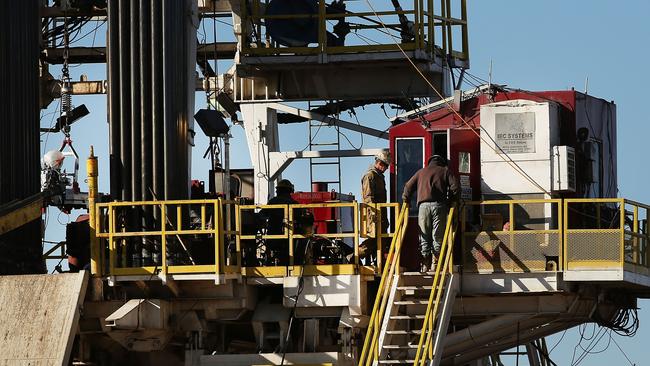
The great underwriter of world inflation, the oil price, is now approaching $US90 a barrel – its highest level since 2014. Behind that simple fact is a seriously worsening situation in the Middle East and a sudden realisation by US President Joe Biden that oil fracking, instead of being his enemy, is now his great friend.
The oil price’s upward momentum is not only being boosted by the failure of the oil industry to invest in exploration and production, but also a seriously deteriorating situation in the Middle East.
This week as Russia flexes its muscles on the Ukrainian border, it also announced that its Pacific fleet – including a missile cruiser, an anti-submarine warfare ship and a large sea tanker – had sailed to Iran’s Chabahar port on the gulf of Oman.
The Russian ships will conduct a joint naval exercise with Iran and China. The exercise is designed to show the US that China and Russia will move in behind Iran in its confrontations with the US. And China will make a nonsense of the US oil embargoes on Iran. China needs Iran oil.
At the same time the pipeline that carries crude out of Iraq, which is the second-largest producer of OPEC oil, has been cut. The pipeline carries oil to Turkey for export to the world.
This is just one of a number of flashpoints in the Middle East that come at a time when it is now clear that oil demand is holding up much better than expected in a world dominated by the Omicron variant of the coronavirus.
The economic damage of Omicron is far less than that caused by previous Covid-19 variants.
All sorts of oil price forecasts are being canvassed for this new environment, but the price looks likely to rise above $US100 barrel, and possibly a lot higher, making inflation reduction very difficult without economic contraction. And high petrol prices are politically unpopular.
We are now seeing European inflation rates starting to match those that are plaguing the US. Suddenly after years of negative interest German bond rates, German bonds are now gaining a positive return on markets, albeit small. The institutions foolish enough to buy those negative interest rate German bonds are suffering well-deserved losses.
Central banks of the world are desperately trying to keep down official interest rates but are losing control of global bond markets, and oil price rises make the central banks’ task even harder.
Meanwhile, my sympathies go to Biden. The US President came into power on the back of a set of anti-oil policies.
On is first day in office, Biden revoked the permit for the Keystone XL pipeline, which was supposed to carry oil from Canada. A week later he issued an order placing a moratorium on new oil-and-gas leases on federal lands and waters.
And then there were a series of measures to make oil fracking more expensive and hence discouraging it.
The oil fracking industry, which had made the US independent of Middle East oil, responded by slashing production.
In the Biden camp, climate change is important but so is the voter devastation being created by high petrol prices. Suddenly, the US frackers are back in favour in the Biden camp and they are ramping up production as fast as they can.
And as the world oil price keeps rising, so does the value of the former BHP oil production units that have been sold to Woodside.
Clearly the world must reduce its carbon emissions, but the Biden presidential campaign and his early actions were a perfect illustration of how not to do it.
The reduction in carbon must take place by changing the technology that we are using, rather than simply by cutting oil production.
Demand for oil will fall as the world moves towards to electrification. When that happens – and the change is taking place rapidly – oil production will fall. But cutting oil production in advance of the technology and in the midst of Middle Eastern turmoil is not sensible. Thankfully, Biden now knows that.



